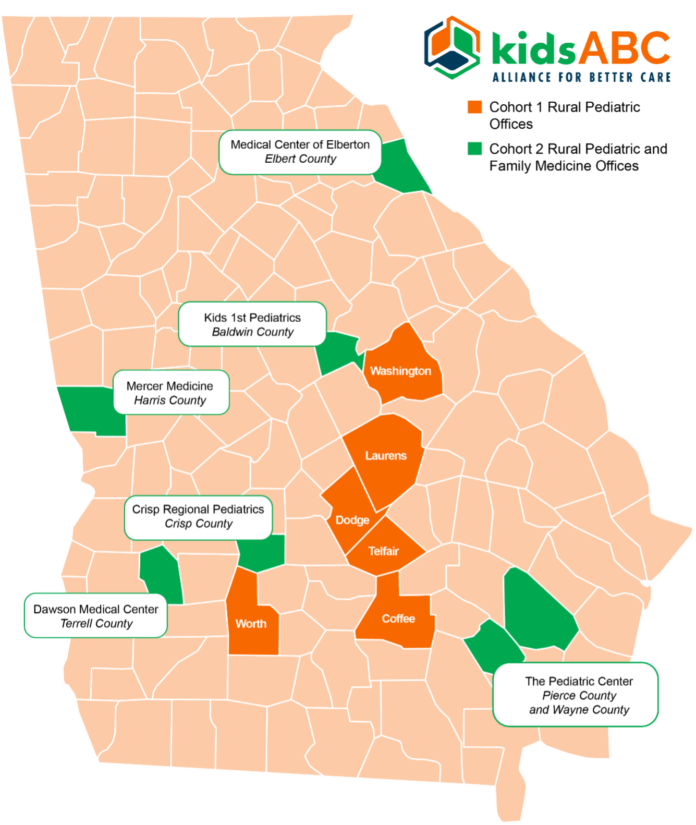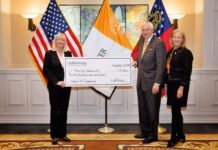MACON —Mercer University School of Medicine (MUSM) and the Georgia Rural Health Innovation Center (GRHIC) are expanding their rural pediatric health initiative to seven additional counties, for a total of 35 pediatric and family medicine physicians and providers throughout the state.
In February 2023, the School of Medicine and GRHIC, with the support of Children’s Healthcare of Atlanta (Children’s), launched a major initiative to strengthen access to pediatric health care in rural communities across the state of Georgia. This effort established the Kids Alliance for Better Care (KidsABC) and involves hospitals, pediatricians and school systems in rural Georgia counties.
The primary goal of KidsABC is to strengthen and expand quality pediatric care and keep care for kids close to home. For year two of the initiative, MUSM and GRHIC have selected these pediatric and family medicine practitioners:
- Crisp Regional Pediatrics (Crisp County): Dr. Kristin Rischar; Dr. Mohamed Elgendy; Emily Lamb, FNP-C; and Shelby Dozier, CPNP-AC/PC
- Dawson Medical Center (Terrell County): Dr. Rupert Dyer; Keisha Johnson, PA; Erin Pate, NP; Rita James, DNP; and Melissa Dozier, NP
- Kids 1st Pediatrics (Baldwin County): Dr. Prabhdeep Brar; Dr. Sokar Kendor; and Dr. Christopher Bowers
- Medical Center of Elberton (Elbert County): Dr. James D. McAvoy; Dr. Glenn S. Poon; Dr. Mark L. Daniel; Dr. Jonathan Y. Poon; Dr. Ralph E. Crowe III; Dr. Matthew Jenkins; Jennifer Coble, FNP-C; and Jillian Johnson, FNP-C
- Mercer Medicine (Harris County): Dr. David Kay and Heather Scrimpshire, FNP-C
- The Pediatric Center (Pierce County and Wayne County): Dr. Stanley Jones; Dr. Eddie Thomas; Dr. Caitlyn Smith Coleman; and Bethany Christine Nile, NP
The rural pediatrician support component of the initiative is two-pronged: physician training and consultation. Subspecialty telehealth care access is available for pediatric patients so care remains local and close to home, if possible.
Georgia’s rural pediatricians are often isolated and without adequate timely access to subspecialty consultation and after-hours assistance. Of Georgia’s 120 rural counties, 63 do not have a pediatrician, and many of the 57 counties with a pediatrician only have one. The KidsABC initiative provides avenues of physician-to-physician support for the purpose of building regional contacts with nearby pediatricians and regional children’s hospitals. An example of that support is the Children’s Rural Access Line Pilot, a direct line for rural providers to seek consultative support from Children’s pediatric specialists. Additionally, the initiative offers physicians and health care professionals training through the KidsABC Rural Pediatric Continuing Education Conference and monthly virtual seminars with subject-matter experts.
For some health issues, rural children often receive treatment from a subspecialist outside of their residential county, placing the burden of travel and time away from work on families. Telehealth services within the pediatric and family medicine clinic setting give patients access to subspecialists from a variety of medical fields, reducing the need for families to travel long distances for in-person appointments.
“Pediatricians and family medicine physicians are vital to the health and well-being of children,” said MUSM Dean Jean R. Sumner, M.D., FACP. “KidsABC provides rural physicians continuing medical education and paths to training, treatment, advice and follow-up on medical conditions from subspecialists. Building relationships with subspecialists and receiving expert guidance via a phone call or through telehealth means children have more opportunities to receive the quality care they need close to home. We believe this initiative will transform health care in rural communities across Georgia. We are grateful for Children’s Healthcare of Atlanta’s support.”
“We are excited to see KidsABC expand to include additional physicians, ultimately impacting more kids across the state,” said Children’s Chief Executive Officer Donna Hyland. “Children’s is proud to support Mercer University School of Medicine and its Georgia Rural Health Innovation Center. They are trusted community partners and this program is possible thanks to their expertise and deep understanding of our rural communities. Their work through KidsABC is helping to ensure access to pediatric care closer to home for more of Georgia’s kids.”
KidsABC brings together a network of rural hospital emergency departments, pediatric offices, regional and state pediatric tertiary care hospitals and school systems to address the challenge of health care access, which many rural families face. KidsABC participants are equipped with the necessary tools, protocols, training and research, so families have access to subspecialty care, mental health care and emergency medical care in their hometowns.
Programs within KidsABC address the challenges of distance to specialty care and limited resources while emphasizing the importance of early intervention in achieving positive outcomes. Children’s has provided specialized pediatric clinical guidance to launch and sustain these programs. Specific work related to this initiative includes:
- Rural hospital emergency department support — Through KidsABC, rural hospitals receive the training and support to build regional pediatric networks. This support helps the hospitals respond to pediatric patients in their emergency departments more effectively. The pilot’s inaugural year included eight rural hospitals.
- Rural pediatrician support — This initiative provides physician-to-physician telehealth support and offers provider training for physicians, advanced practice practitioners and nurses. Four rural pediatricians practicing in five rural counties were part of the pilot.
- Behavioral and mental health support — MUSM, GRHIC and Children’s worked with schools to deliver mental health and wellness assessments to students and develop interventions appropriate for local needs. Virtual mental health counseling is made available as well as training in suicide awareness and prevention and stress management.
Additionally, to increase the health care workforce in rural communities, the Children’s Healthcare of Atlanta Rural Pediatric Scholarship Program was established to provide 10 scholarships each year for MUSM pediatric medical students who have committed to living and serving in rural communities. This year, a new Children’s Healthcare of Atlanta Marriage and Family Therapy Scholarship Program was established to provide scholarships for marriage and family therapy students who are committed to living and working in rural Georgia and providing mental health services to rural children.
KidsABC programs will continue expanding with the selection of additional rural hospitals, pediatric and family medicine offices and school systems in rural counties across Georgia for the next eight years as part of the ten-year initiative.
About Mercer University School of Medicine (Macon, Savannah and Columbus)
Mercer University’s School of Medicine was established in 1982 to educate physicians and health professionals to meet the primary care and health care needs of rural and medically underserved areas of Georgia. Today, more than 60 percent of graduates currently practice in the state of Georgia, and of those, more than 80 percent are practicing in rural or medically underserved areas of Georgia. Mercer medical students benefit from a problem-based medical education program that provides early patient care experiences. Such an academic environment fosters the early development of clinical problem-solving and instills in each student an awareness of the place of the basic medical sciences in medical practice. The School opened additional four-year M.D. campuses in Savannah in 2008 and in Columbus in 2021, and a clinical campus in Valdosta in 2024. Following their second year, students participate in core clinical clerkships at the School’s primary teaching hospitals: Atrium Health Navicent The Medical Center and Piedmont Macon Medical Center in Macon; Memorial Health University Medical Center in Savannah; Piedmont Columbus Regional Hospital and St. Francis Hospital in Columbus; and SGMC Health in Valdosta. The School also offers master’s degrees in preclinical sciences and family therapy and Ph.D.s in biomedical sciences and rural health sciences.
About Georgia Rural Health Innovation Center
In 2018, Georgia lawmakers dedicated special funds to establish a new Rural Health Innovation Center tasked with confronting the complex health care challenges and wellness disparities facing rural communities. Mercer University School of Medicine was awarded the grant funds in 2019 and formally established the Georgia Rural Health Innovation Center on its Macon campus. MUSM boasts a longstanding commitment to serving rural Georgia’s health needs, with a mission to educate physicians dedicated to tackling the health challenges in rural Georgia. The Rural Health Innovation Center serves as a critical resource to rural communities to improve access and effectiveness of health care by offering research, collaboration, and training opportunities.
About Children’s Healthcare of Atlanta
As the only freestanding pediatric healthcare system in Georgia, Children’s Healthcare of Atlanta is the trusted leader in caring for kids. The not-for-profit organization’s mission is to make kids better today and healthier tomorrow through more than 60 pediatric specialties and programs, top healthcare professionals, and leading research and technology. Children’s is one of the largest pediatric clinical care providers in the country, managing more than 1.1 million patient visits annually at three hospitals (Egleston, Scottish Rite and Hughes Spalding), Marcus Autism Center, the Center for Advanced Pediatrics, urgent care centers and neighborhood locations. Consistently ranked among the top children’s hospitals by U.S. News & World Report, Children’s Healthcare of Atlanta has impacted the lives of kids in Georgia, across the United States and around the world for more than 100 years thanks to generous support from the community.










